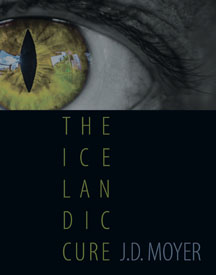Description
Winner of the Omnidawn 2016 Fabulist Fiction Prize
Selected by Bradford Morrow
In the year 2021, Jane Tokugawa leads a U.S. delegation from the Center for Disease Control to investigate a new retroviral gene therapy approved in Iceland, a shining nation churning out Olympic medalists, chess masters, and brilliant artists. As Tokugawa learns more about the Hratthníf protocol from head scientist/founder Ásdís Lúthersdóttir, she begins to question the motives of some of her delegation’s members. Hratthníf (“fast knife”) is curing diseases and mental illness, changing lives for the better. But who controls it? What are the limits? As the true mission of her delegation becomes clear, Tokugawa makes a decision that will affect millions of lives.
The year is 2021. Three American scientists and a State Department official are dispatched to investigate what appears to be a breakthrough in bioengineering that has made Iceland the envy of the world. How is it this sparsely populated country suddenly boasts musicians, athletes, intellectuals, artists who rank among the most outstanding on the planet? And what exactly are the activities in the Hratthnif labs that have brought these revolutionary scientific advances into being? Narrated by delegation leader Jane Tokugawa—a self-described “nerdy” woman who is, indeed, nimble, engaging, and memorable—“The Icelandic Cure” skillfully depicts a future disturbed by age-old conflicts. What are the ethical consequences of refashioning our genes at will, mostly in the cause of humankind’s betterment but perhaps not always? And who has the right to control such Pygmalion technologies? J.D. Moyer’s “The Icelandic Cure” is a compelling, timely, well-researched story that raises important questions, even as it unspools a narrative that engrosses from beginning to startling end.
Bradford Morrow, judge of the Omnidawn Fabulist Fiction Prize
About the Author
Reviews
Excerpt
J.D. Moyer lives in Oakland, California, with his wife, daughter, and mystery-breed dog. He writes science fiction, produces electronic music in two groups (Jondi & Spesh and Momu), runs a record label (Loöq Records), and blogs at jdmoyer.com. His previous stories have appeared in Strange Horizons and Cosmic Roots And Eldritch Shores. His first novel, The Sky Woman, is forthcoming from Flame Tree in 2018.
^ back to menu
Moyer’s novelette, winner of the 2016 Omnidawn Fabulist Fiction Prize, is a curious blend of ethical thought exercise and medical jargon couched in introspection. Jane Tokugawa is a representative of the U.S. Center for Disease Control, part of a delegation sent to Iceland to learn about a new gene-altering technology that promises to revolutionize health care and potentially eradicate physical and mental illnesses.
This is a strong, thoughtful story that inspires hope for the future, curiosity about medical progress, and sheer terror at what might be done in its name.
Moyer’s research into neurology and gene therapy gives Jane a credible persona. Her intellectual progress as she unearths fragments of the mystery is lovingly tied to the ever-greater—and ever more crucial—questions of self-determination. . . . Jane writes, “Who wouldn’t fix a genetic flaw or two if they could?” Beyond the human desire for personal improvement, the consequences of this technology involve systemic corruption and the preservation of our right to choose.
Tuesday, June 8th, 2021–personal journal of Jane Tokugawa
Arrived at Keflavík around 1am, direct from Atlanta. Skies overcast, reminded me of late Fall in Detroit. Felipe, Jacob, and I picked up our bags, breezed through customs, took the shuttle to our hotel in Reykjavík. Randall took a private car, citing security concerns, though Iceland has remained free of the terrorism that continues to plague mainland Europe.
Plague. You would think a Center for Disease Control employee wouldn’t use that word figuratively. But it’s such a good word.
Our delegation has four members. Three from the CDC: myself (leading the delegation as Senior Scientist), Jacob Weisman (Ethics Program Specialist), and Felipe Hernandez (Technical Mission Support). Randall Lewis is from the State Department, Arms Control and International Security Affairs. Met him in person for the first time today, not sure what his exact title is. Gruff, bald, hard-to-read.
We’re here to look into a new gene therapy treatment recently approved in Iceland, and attracting a great deal of medical tourism from the U.S., Europe, and Asia (limited to those that can obtain a visa–Icelandic immigration control has tightened noticeably this year).
Jacob fell asleep–or pretended to–on the shuttle, and either accidentally or sneakily rested his hand against my thigh. I scooted away, making the shuttle ride even more uncomfortable (the heat was on too high–I felt nauseous). He’s been passive-aggressively flirting with me since we were assigned to this team. Nothing obvious enough to confront. I want nothing to do with Jacob in that way, but I’m hoping I don’t have to be blunt about it.
Felipe, on the other hand, what a cutie. Too young for anything serious, but if he finds his way to my hotel room one of these nights, I won’t turn him away. We’re here for nine days, investigating Ásdís Lúthersdóttir’s retroviral gene therapy protocol, so there might be opportunities. Not sure if he’s into nerdy half-Japanese women twice his age, but he’s friendly enough. Even odds for a hookup between me and the tech.
Pressed up against the window, I lost myself in the landscape (a dozen shades of blue-green lichen clinging to dark gray rocks, no trees) and endured the ride, thinking about our mission. Ostensibly, it’s to verify that Lúthersdóttir’s individually engineered retroviruses aren’t contagious. But two things make me think this is a fishing expedition:
1–the presence of Randall Lewis from the State Department.
2–Lúth¬ers¬dótt¬ir started human trials back in ‘18, and there hasn’t been even a whiff of any contagion threat. So why investigate now? My guess? Iceland is shining, a brilliant, blinding star of a nation. Eighteen medals (including three gold) at the Tokyo Olympics, a stunning number for a nation of only four hundred thousand citizens. Three of the world’s top ten ranked chess masters. Dozens of newly world-famous musicians, actors, and authors. A thriving economy, dominating a number of niche industries (including bioengineering–thanks in no small part to patents originating from Hratthníf–Lúthersdóttir’s lab).
It’s not the CDC’s job to find out what they’re putting in the water in Iceland (and if Lúthersdóttir has anything to do with it) but I’m concerned that’s what we’ll be used to find out.
^ back to menu





